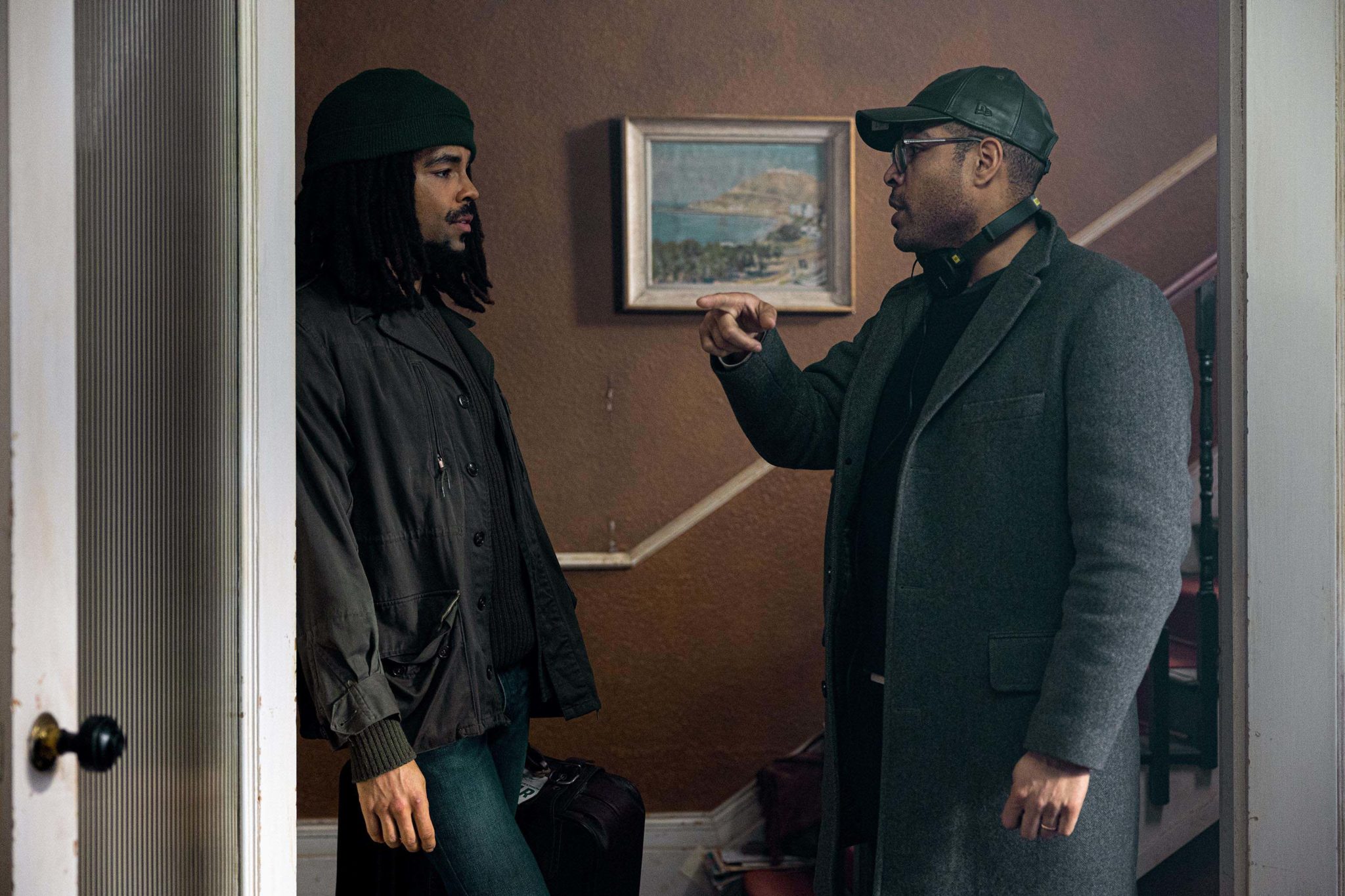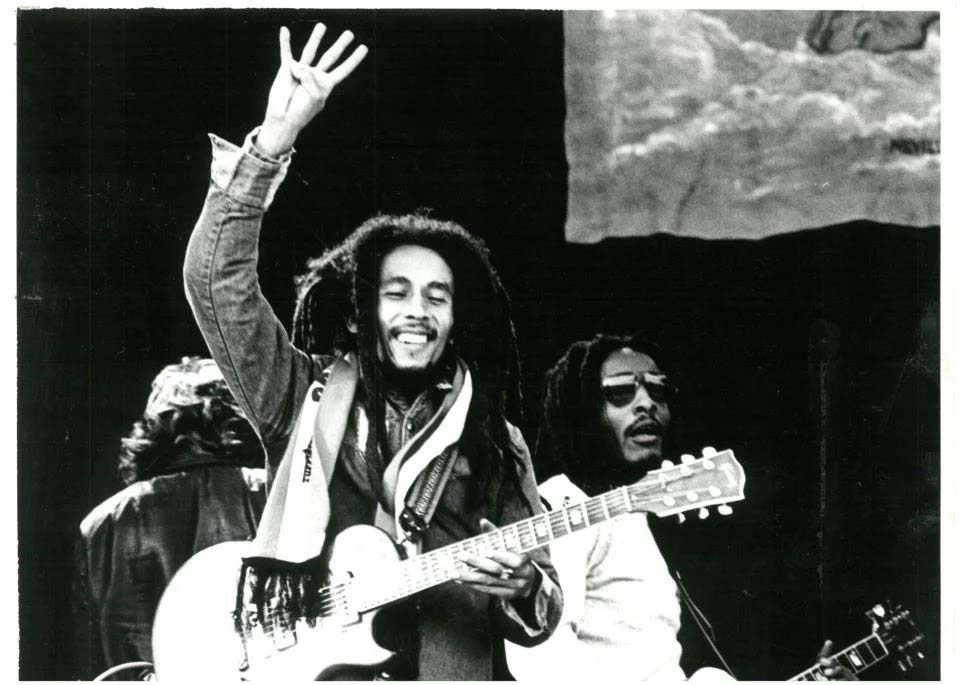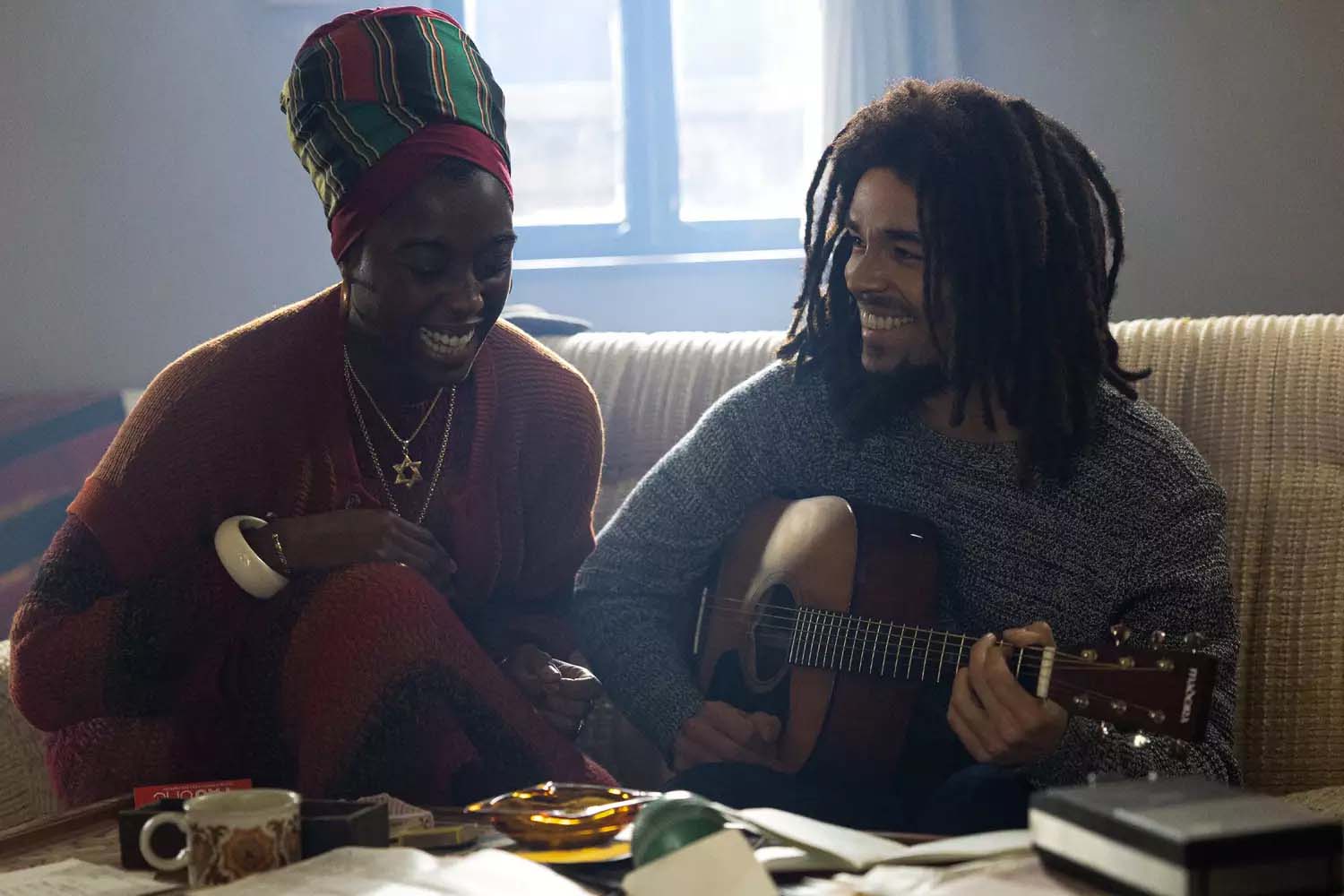- Film And TV
- 15 Feb 24
Bob Marley: One Love – "It’s one thing to dance, it’s one thing to say ‘One Love’, but he was saying it for something higher"

Director Reinaldo Marcus Green, and stars Kingsley Ben-Adir and Lashana Lynch, discuss Bob Marley: One Love, the hotly anticipated biopic of one of music’s most revered and iconic figures.
When Ziggy Marley approached actor Kingsley Ben-Adir to play reggae icon and political activist Bob Marley in an upcoming biopic, Ben-Adir’s initial instinct was to run in the other direction. He had even dodged auditioning for a long time. Despite playing Malcolm X and Barack Obama onscreen in One Night in Miami… and the TV series The Comey Rule, playing Marley felt like an epic responsibility, and the 37-year-old wasn’t sure he was ready.
“I passed on the audition, because I was convinced there’s no way that I’m right to play Bob, for many reasons – I can’t sing, can’t dance, I’m too tall,” Ben-Adir laughs. “They told me they’d been on a worldwide search, and I said, ‘ Maybe you should go on another one?!’”
But learning more about the project, Ben-Adir became intrigued. Bob Marley’s family were all on-board, with Marley’s son Ziggy producing. At the helm was Reinaldo Marcus Green, known for directing Monsters And Men, Joe Bell, and most recently King Richard, which starred Will Smith as Venus and Serena Williams’ father. Calling Marcus Green’s work “beautiful, understated and dignified”, Ben-Adir was convinced to submit an audition tape.

Kingsley Ben-Adir with director Reinaldo Marcus Green
“I didn’t do the singing scene, because I thought that was a fast way to make them go ‘Absolutely not!’” he reflects. “But there was a scene that I felt captured what I thought to be Bob’s essence at the time. I tried to bring some of his energy to it in the studio, rallying the troops and conducting and creating songs.”
After sending in a tape, Ben-Adir spent a week with Ziggy and Rita Marley, and by the end of the week, they knew they had found their Bob. It was only then that Ben-Adir allowed himself to grasp how momentous the project would be, and how much it meant to him personally.
“Who wouldn’t want to spend a year or two in the mind of such an iconic musical genius?” asks the actor, who grew up in Kentish Town in London. “Bob Marley would have been playing in my house as far back as I can remember. The Notting Hill Carnival was my childhood, I was there from one to three-years-old. So when I heard I got the role, just on a selfish level, I was like, ‘Oh, at least I get to spend a couple of years with Bob.’”
Bob Marley: One Love will let audiences spend a couple of years with Bob, too. Instead of crafting a birth-to-death biopic, director Reinaldo Marcus Green, who co-wrote the screenplay, has crafted an intimate portrait of Marley’s life and fame. The story traces the assassination attempt against him in December 1976, to his historic performance at the One Love Peace Concert in Kingston, Jamaica in April 1978.
The concert hoped to create unity during the volatile political crisis between the country’s two major political parties, the Jamaica Labour Party and the People’s National Party. During this time, Marley was also creating his most iconic work, with his album Exodus being released in 1977. The film captures Marley at the height of his influence, a few years before he died of melanoma in 1981, aged only 36.
For Green, focusing on this small but rich part of Marley’s life and career was more revealing than trying to race through a lifetime of creative wonder and personal milestones.
“It was a snapshot of his life,” he notes. “It’s a window into what was happening to and around him at that time, politically, culturally, creatively and personally. His family were helping him become a global icon, so it was very rich period of time.”
Having the support of Marley’s family was crucial for Green. He would not have taken on the project had Ziggy not been onboard as a collaborator and producer.
“From the very first call about the project, Ziggy Marley was on that call,” he says. “So once I got Ziggy’s blessing, obviously your confidence goes up. I knew I couldn’t make this movie without the support of the family. Similarly to King Richard, without the family, I couldn’t have made the movie. They were an incredible resource for us, still to this day. They’re true producers in that way.
“I felt very lucky to have Ziggy as a creative partner who respected me as a filmmaker, but who was also there as a resource whenever I needed. I never met Bob, he died the year I was born. But like many people, I feel like I’ve met him through TV. I got all these character details through spending time with the family and friends. I got to know Bob, at least in my own way, which was special.”

Bob Marley in Dalymount Park, Dublin. Credit: Colm Henry
Green knew that finding the right actor to play Marley was vital. The director watched “thousands” of audition tapes before seeing Kingsley Ben-Adir’s take on the character – and Green immediately knew he had found someone special.
“He didn’t do an imitation of Bob like a lot of the other people,” he explains. “Instead, he gave an interpretation that I thought that was really interesting. He skirted away from the interview version of Bob, and I thought that was a really smart choice. It made me think, ‘Okay, I’m dealing with a very intelligent actor, who understands the spirit we need. I knew that that was a great baseline.’”
Ben-Adir had played real figures before, and always has essential questions and insights he uses to understand a character.
“Hopes, fears and dreams,” says the actor. “For character in general, it’s all trying to get to a place where you understand what their motivation for the story is. You look at conscious motivation, subconscious motivation, and the things getting in their way. From an acting point of view, that’s always where you’re trying to get to. You want to come into a scene and have something going on underneath the exterior level.”
Ben-Adir worked spent weeks In Trenchtown with Marley’s friends and family, gathering stories that would help his portrayal. The experience of preparing and shooting in Jamacia was also deeply important to co-star Lashana Lynch, who audiences will know from No Time To Die and The Woman King, as well as playing Maria Rambeau in the Marvel Cinematic Universe. Lynch, who plays Rita Marley in One Love, was born in London but is of Jamaican descent. She was thrilled not only to be filming in Jamacia, but also felt passionately that the film needed to capture the beauty and complexity of the country, and not just the stereotypes all too often portrayed onscreen.
“Whenever I’ve seen Jamaica onscreen, it usually goes one of two ways,” she observes. “It’s either a complete fantasy, like a romantic island that has nothing else happening, or it’s violence or corruption. Now, both of those things occur in all places around the world, whether you see it aesthetically, or internally as a feeling in that country. In Jamaica, I wanted to have a balance between the truth of neighbourhoods, but also the beauty of the vibration of the island. I think we were able to do it in certain moments, where you see Bob and Rita at the same time with the children.
“You feel the vibrancy of the island, which is exactly what it deserves to be, especially at that time in the ‘70s when children were able to run around the street. It was doors open and community driven, where everyone knows each other. It’s very personal. That feeling is what I was most after, which is why I was looking at the monitor a lot on set, to see how we were capturing this truth. What does the sand look like? What kind of lighting are you after? It’s important, because for some people – if they’ve not been or not heard about Jamaica – that’s what they’ll lock into. I want to make sure that’s a positive experience for audiences.”
Lynch was also thrilled to spend several days with Rita Marley in her home.
“I naturally ended up sitting with my legs crossed on the floor in front of her, for hours,” she says. “I was just soaking her in like a child, which I think was the correct approach actually, when dealing with the most regal iconic queen of my country!”
Lynch hopes that audiences not only leave the film understanding Bob on a more human level, but also Rita, who is a truly remarkable singer, writer and activist in her own right.

Lashana Lynch and Kingsley Ben-Adir
“One of the most important things I’m hoping younger generations see is just how much of a backbone she was for Bob,” says Lynch. “She was always there with a different level of strength and protection. She has sometimes described it as like a sibling love, whereby you’re always going to love each other no matter what. And when I first read that, I thought, ‘What does that mean? How does that work for romantic relationships?’ But there’s this surreal, somewhat magical but also extremely rooted love they share.
“His respect for Rita, even at different times when they were going through a lot, meant he could only fall back on her, and her words and hope, for his solidifying of self on the earth. I can only describe it as that. Whenever I tap into what they feel, their energies were in this part of their relationship. I feel like Bob and Rita were two old trees in the forest with roots that go far and wide. Because the respect is there, they always come back together, which is incredible.”
One thing that was vital for Reinaldo Marcus Green was that audiences leave with a heightened insight into the nuance and brilliance of Marley’s work, particularly the iconic song from which the film gets its title.
“We all we know the tunes and we dance to them,” he says. “It’s got a vibe and we connect to it. But I don’t think I even really understood the lyrics until I had to dissect them. So I hope the movie brings you closer to understanding what the words mean. Now, when I hear the song, it means something different for me. I hope people can feel that too. It’s one thing to dance, it’s one thing to say ‘One Love’, but he was saying it for something higher. Once you connect with it on that level, it opens up a whole other dimension.”
For Ben-Adir, truly understanding and the conveying the meaning of Marley’s work was one of the most important parts of his preparation. He spent months working with linguists and dialect coaches to learn how to speak like Marley, incorporating Jamaican patois, which the actor said helped him not just in speaking and performing like the artist, but understanding him emotionally.
“What was so impactful for me,” he says, “was understanding that this album Exodus – which is widely regarded as one of the greatest albums of all time – was created so soon off the back of such an incredible trauma. There was the ongoing civil war, and the attempted assassination of Bob and his family, which meant they had to leave. In a kind of exile, really, Bob went into an intense creative period. Exodus comes out of that.
“As an actor that was so interesting. There were ideas of trauma and complex PTSD, and feeling rejected by your own people. Then there was the conflict, the pressure and the struggle he was involved in. All that struggle is so closely connected to the story of the creation of this album. Bob’s music speaks for itself and it’s everywhere.
“But for me, throughout the process of understanding the lyrics in a profound way, I realised that most people outside of Jamaica only understand a small part of what Bob said in the songs. Because he is singing in a foreign language, essentially. But my hope is this film will reignite our need to go back and check in with the message, because it’s beautiful.”
Much like Ben-Adir, Lashana emphasises how transformative Marley’s work becomes when you understand the context in which he was writing. She also believes the film is transformative in how it presents the importance of art generally – and Marley’s music in particular – as a unifying force.
“I believe, especially these days, there is a pressure to ensure that your art is palatable,” says Lynch. “That it will garner this global understanding, which will make you an overnight success and a legend for the rest of time. What I’ve learned about Bob, Rita and their process is that there was never a want to be a superstar, or a want to have the love and adoration of the masses. It’s more of an understanding globally of what they represent internally, which is love.
“I know that will sound clichéd to some people, but truly as a human race, to be able to have a certain level of peace means you always move from an equilibrium within yourself. That is mind-blowing – that’s what I felt when I sat with Rita. I thought, ‘Oh, that is exactly what they did.’ Their musical creations are legendary, because they didn’t make it to sound good – they made it to feel good. The vibration within the music is the real art. Everything else was just constructed around the vibration which is so rare these days, and we need it so much.”
Bob Marley: One Love is in cinemas from tomorrow, February 16.
RELATED

- Film And TV
- 16 Feb 24
Bob Marley: One Love album is out now

- Film And TV
- 06 Jul 23
Trailer released for new Bob Marley biopic
RELATED

- Competitions
- 07 Mar 22
WIN: 2 Tickets to Special Screening of Rebel Dread in the IFI, Q&A with Don Letts

- Film And TV
- 14 Feb 22
Kingsley Ben-Adir to play Bob Marley in new biopic from King Richard director

- Film And TV
- 07 Oct 20
'I Can See Clearly Now' singer Johnny Nash dies, aged 80

- Film And TV
- 31 Mar 20
Bob Marley: Legacy series continues with 'Women Rising'

- Film And TV
- 17 Feb 20



